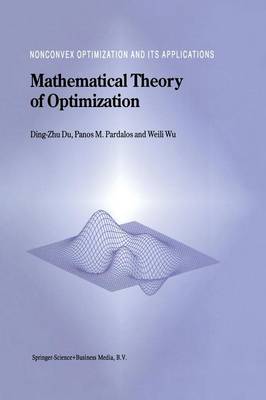Nonconvex Optimization and Its Applications
4 primary works
Book 33
This collection of challenging and well-designed test problems arising in literature studies also contains a wide spectrum of applications, including pooling/blending operations, heat exchanger network synthesis, homogeneous azeotropic separation, and dynamic optimization and optimal control problems.
Book 37
Book 48
Introduction to Global Optimization
by R Horst, Panos M. Pardalos, and Nguyen Van Thoai
Most of the existing books on optimization focus on the problem of computing locally optimal solutions. Introduction to Global Optimization, however, is a comprehensive textbook on constrained global optimization that covers the fundamentals of the subject, presenting much new material, including algorithms, applications and complexity results for quadratic programming, concave minimization, DC and Lipschitz problems, and nonlinear network flow. Each chapter contains illustrative examples and ends with carefully selected exercises, designed to help students grasp the material and enhance their knowledge of the methods involved.
Audience: Students of mathematical programming, and all scientists, from whatever discipline, who need global optimization methods in such diverse areas as economic modelling, fixed charges, finance, networks and transportation, databases, chip design, image processing, nuclear and mechanical design, chemical engineering design and control, molecular biology, and environmental engineering.
Book 56
Mathematical Theory of Optimization
by Ding-zhu Du, Panos M. Pardalos, and Weili Wu
This book provides an introduction to the mathematical theory of optimization. It emphasizes the convergence theory of nonlinear optimization algorithms and applications of nonlinear optimization to combinatorial optimization. Mathematical Theory of Optimization includes recent developments in global convergence, the Powell conjecture, semidefinite programming, and relaxation techniques for designs of approximation solutions of combinatorial optimization problems.



